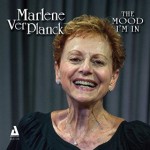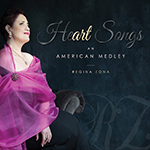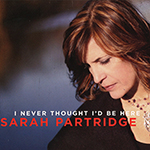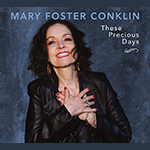Geraldine Fitzgerald
Streetsongs
(Harbinger Records)
October 24, 2020
Reviewed by Jerry Osterberg
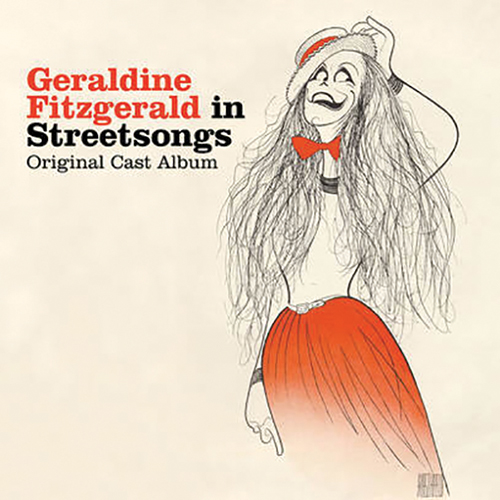
After an absence from the New York City entertainment scene of several years, cabaret re-emerged in the early 1970s stronger than ever. Venues such as The Ballroom, Michael’s Pub, Backstage, Don’t Tell Mama, The Duplex, Eighty Eight’s, The Grand Finale, and The Cookery were doing good business and provided stages for an entire spectrum of singers, including well-known professionals who had decided to give cabaret a try during their time away from film and theater. Stars such as Diane Keaton and Sally Kellerman, neither known as singers, were suddenly performing just inches away from the audience.
One of the most successful of the new clubs was Reno Sweeney, which, in 1974 was offering auditions to theater performers whose Monday evenings were normally free. The notice caught the attention of the Irish born actress Geraldine Fitzgerald, who submitted her name to the queue of hopefuls. Although Fitzgerald had a brilliant résumé of television, film, and theater performances—Dark Victory, Wuthering Heights, The Pawnbroker, Heartbreak House, and Long Day’s Journey Into Night—there wasn’t anything to suggest that she could sing. Reno Sweeney turned her down. After a performer who was scheduled at the club pulled out at the last minute, Reno’s called Fitzgerald back and offered her the slot on the condition that she had an act. When Fitzgerald said yes, in spite of the fact that she wasn’t truly stage ready, the non-singing actress was hired immediately.
At that moment, Fitzgerald was working with Richard Maltby Jr., on an adaptation of Marc Blitzstein’s Juno, a musical version of Juno and the Paycock. Maltby, still a few years away from winning his first Tony Award, had directed acts and revues, and volunteered to help her. They decided to build her act around the songs from her Irish childhood along with the music-hall songs she would sing as she walked along the streets. Before to being cast in Juno, Fitzgerald appeared in the role of Pirate Jenny in The Threepenny Opera in 1972. Although the character of Jenny is a minor one, Fitzgerald was singled out as “…the only one in the cast who has complete mastery of the material.” The reviewer went on: “One wishes that Miss Fitzgerald would sing ‘Mack the Knife.’”
Fitzgerald’s reception was good enough to win her a return engagement at Reno Sweeney in 1976. Within another three years, her cabaret act had developed into a complete show, Streetsongs. It enjoyed a long run at the Roundabout Theater and was televised nationally by PBS. At a week-long engagement at the Great Lakes Shakespeare Festival in 1981, the performance was recorded. Originally released in 1983, the album was re-released earlier this year by Harbinger Records, under the auspices of The Musical Theater Project, a non-profit formed in 2000 to foster a deep appreciation of the American musical.
One doesn’t need to be Irish to enjoy this collection of delightful songs of an earlier era, some of them connected to World War II, a time in which aerial bombing, also known as “the Blitz,” plagued London without pause for months. The songs have been described as lifting the spirit in times of trouble and stress. They were the stuff of traditional Irish music and the London music halls.
Listeners will recognize many song titles as well as the names of the songwriters. “Underneath the Arches” was a perennial favorite of the music-hall audience, and was often included in a medley by old-timers who were always in-the midst of an annual farewell tour. It referred to a shopping bag lady without a worry in the world as she meandered beneath the bridges along the River Thames. Adding much luster to the enjoyment of Fitzgerald’s album is that she provides the history of the songs. “Danny Boy,” thought to be the lament of a legendary Irish hero, has had countless interpretations. Fitzgerald’s version, a favorite of many, is that the song is connected to the “Great Hunger,” the Irish potato famine of the 1840s. The lyrics tell the story of a young couple who are committed to each other, and the story picks up when the boy is about to sail off to America in order to prosper and come back to rescue his family. As he’s saying farewell to his intended, she’s thinking she’ll likely be dead by the time he returns. With a gentle Irish brogue, Fitzgerald conveys a tale which is touchingly sad.
“Kerry Dance” is a funny story of the so-called “nights of madness” in which the young dancers, having diligently followed the strict rules with regards to the national dance up to now, run off to the heath and glen and dance with abandon to a full pipers band. “Four Green Fields” is a sweet, melodic ballad which was associated with times of conflict during which the people were not allowed to utter the name of Ireland. It was essentially a code to describe the four provinces of Ireland without saying their names. This was one of a variety of ways in which people could refer to their country in secret, as with names such as “Kathleen O’Holligan” or “The Old Lady.”
Beginning with “The Pig Song,” backed by a rousing chorus of jolly revelers, Fitzgerald performed a succession of “street songs” in a cockney accent, creating the mood of a friendly English pub, the happy patrons swaying side to side and singing with gusto between sips of London Pride. Since the definition of “street songs” might not be self-evident to everyone, the singer explains that these are not the songs buskers might sing, but music hall tunes she likes to perform while out walking. Fitzgerald segues neatly from “The Pig Song:” “You can tell a man who boozes by the company he chooses, then the pig got up and slowly walked away,” to “Saturday Night at the Rose and Crow,” an atmospheric pub tune written by Noël Coward. Fitzgerald closes with a stirring medley of “Underneath-the-Street Songs,” which include “Smile,” “Pack Up Your Troubles,” “When You’re Smiling,” and “The White Cliffs of Dover,” all of them sure to bring a tear or two.
When Geraldine Fitzgerald became a cabaret singer after years in film and on the big stage, it couldn’t have been a big leap, other than one of faith. Although cabaret audiences have been known to allow performers with less than perfect voices some slack, her trained voice was more interesting. During an interview sometime after the large-scale production of Streetsongs at the Great Lakes Shakespeare Festival, Fitzgerald talked about her cabaret debut a decade earlier. She described the melody of a song as something which “acts as a kind of vehicle for emotional expression,” going on to say that the music acts as a “releasing agent,” and is “liberating.” For her, a song had to enable the performer to tell a complete story. Listening to this newly released CD, it became clear that it’s truly a collection of short stories, wonderful to revisit again and again, told by an amazing storyteller whose final chapter may have been her best.


